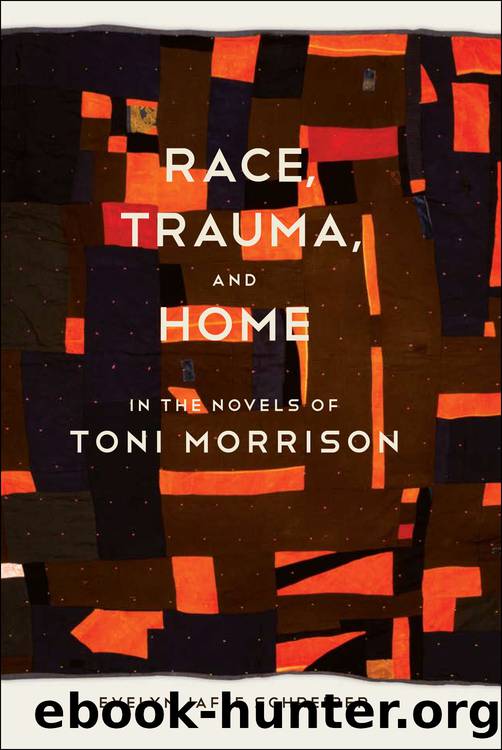Race, Trauma, and Home in the Novels of Toni Morrison by Evelyn Jaffe Schreiber

Author:Evelyn Jaffe Schreiber
Language: eng
Format: epub
ISBN: 9780807138175
Publisher: LSU Press
Published: 2010-08-15T00:00:00+00:00
FOUR
Bodies of Trauma
Memory, Home, and Subjectivity in Love
As we saw in the previous chapter, neither relocation nor total isolation alleviates the deeply rooted trauma carried over from slavery. Aggression, an alternative response that mirrors the master narrative, serves as an insufficient solution, as we saw in chapter 2. As in Morrisonâs previous novels, in Love characters are displaced from home, orphaned, and abandoned, and even Cosey himself, like others, remains scarred by American culture. Cultural re-creation of slave trauma indicates the deficiency of the white mirror for black culture, and despite movements of social progress, white cultureâs denial of black desire perpetuates the black struggle for subjectivity. In Love, Coseyâs Hotel and Resort serves both as a physical and a psychic space, a site of personal and collective memory that boosts the self-concept of Coseyâs community and of his family. Yet the helplessness resulting from both communal and personal trauma overwhelms the characters, and like Morrisonâs other novels, Love illustrates the reliance on the past and memory for a sense of self.
Nostalgic memory, connected to home as a physical place and the people associated with it, protects the fragile ego. Both the past and possessions come to represent home in their reflection of a positive self. Love suggests that despite the historical distance from slavery, the black community remains vulnerable to cultural forces. Characters rely solely on family members and a sheltered, small community to reflect a self, with access to wealth and power shaping status and thus subjectivity. The failure of Coseyâs Hotel and Resort, like the failure of Ruby in Paradise and Maconâs summer homes at Honore in Song of Solomon, suggests that despite shifts in social conditions, a core trauma remains. Healing requires giving voice to black trauma so as to override the values of white culture and name personal desire.
Love tells the story of Bill Cosey, the effect of his Hotel and Resort on his Florida community, and the family that survives him. Cosey uses the money his father makes as an informant to create a vacation escape for the greater black community. In addition, Cosey employs many blacks in the local vicinity and serves as a role model because of his generosity and success. His loyal cook, L, adds warmth to the hotel and helps to raise his son, Billy, when Coseyâs wife dies. Billy marries May, the daughter of an impoverished minister, who makes it her mission to keep Billy and Cosey happy and the hotel in superlative condition. Unfortunately, Billy dies young, leaving May and their daughter, Christine, in Bill Coseyâs care. After playing the field, Cosey chooses to marry Heed, Christineâs eleven-year-old lower-class playmate. This action results in tensions and hostilities among the women in the household that escalate when Bill Cosey dies, leaving a questionable will.
The novel opens with an aging Christine and Heed at war over Coseyâs property, with Heed hiring a young homeless waif, Junior, to assist her. For both Christine and Heed, Coseyâs property represents a worthy self. By fighting over the estate, they express their need for personal recognition.
Download
This site does not store any files on its server. We only index and link to content provided by other sites. Please contact the content providers to delete copyright contents if any and email us, we'll remove relevant links or contents immediately.
4 3 2 1: A Novel by Paul Auster(12376)
The handmaid's tale by Margaret Atwood(7757)
Giovanni's Room by James Baldwin(7330)
Asking the Right Questions: A Guide to Critical Thinking by M. Neil Browne & Stuart M. Keeley(5761)
Big Magic: Creative Living Beyond Fear by Elizabeth Gilbert(5756)
Ego Is the Enemy by Ryan Holiday(5415)
The Body: A Guide for Occupants by Bill Bryson(5082)
On Writing A Memoir of the Craft by Stephen King(4935)
Ken Follett - World without end by Ken Follett(4723)
Adulting by Kelly Williams Brown(4566)
Bluets by Maggie Nelson(4548)
Eat That Frog! by Brian Tracy(4526)
Guilty Pleasures by Laurell K Hamilton(4439)
The Poetry of Pablo Neruda by Pablo Neruda(4098)
Alive: The Story of the Andes Survivors by Piers Paul Read(4023)
White Noise - A Novel by Don DeLillo(4006)
Fingerprints of the Gods by Graham Hancock(3996)
The Book of Joy by Dalai Lama(3976)
The Bookshop by Penelope Fitzgerald(3844)
